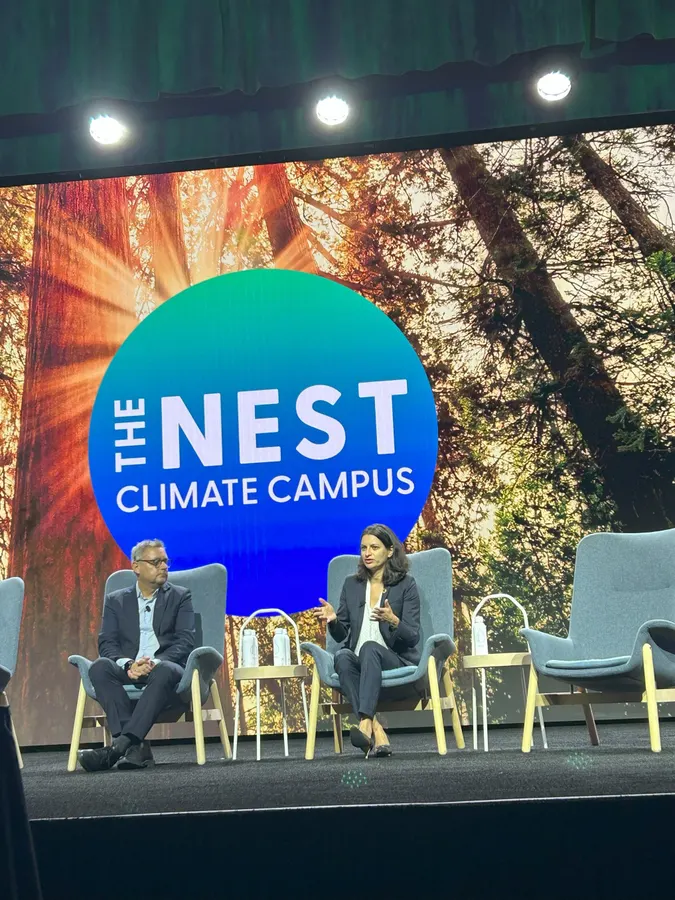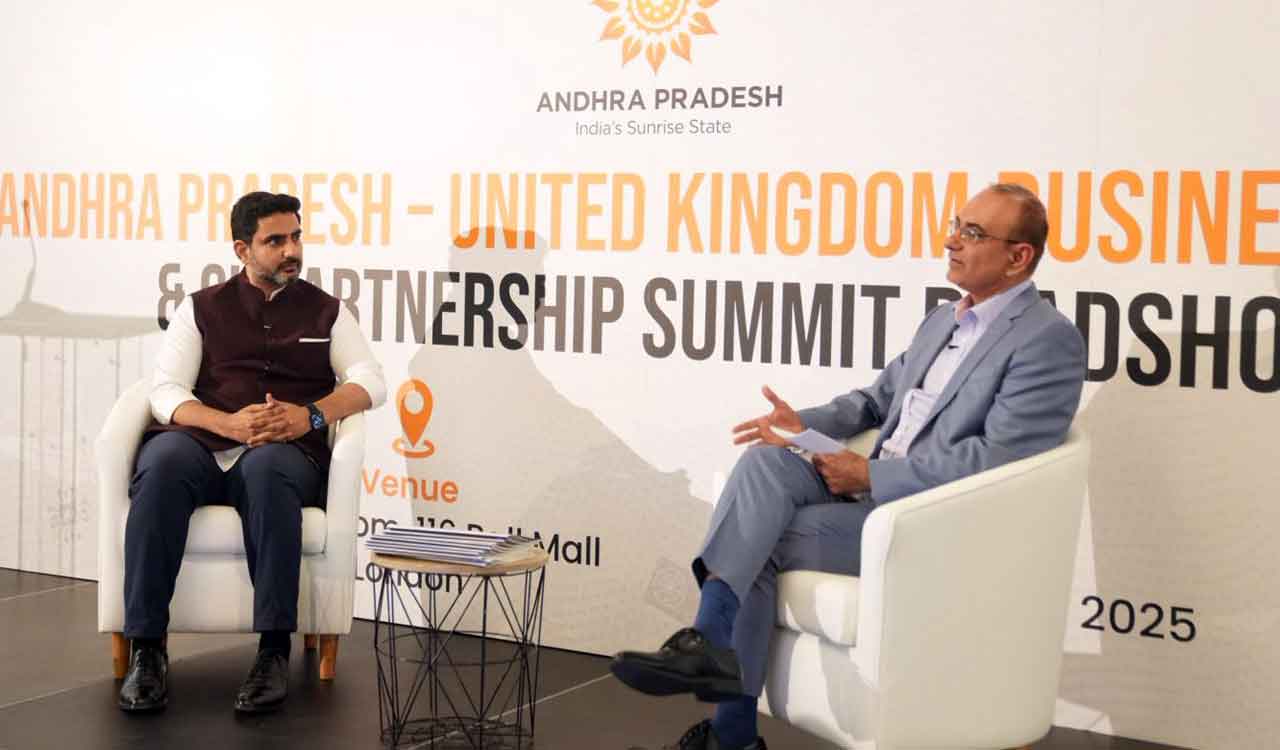By Contributor,Joan Michelson
Copyright forbes

Dominic Waughray, World Business Council for Sustainable Development (l), and Schneider Electric CSO Esther Finidori (r) at Nest, Climate Week 2025, Photo by Joan Michelson
Joan Michelson
It was a tale of two cities in New York City last week. There were the geopolitical dynamics at the annual United Nations General Assembly that brought together leaders and dignitaries from 193 countries to address a range of pressing issues including the two-year old Israel-Hamas-Gaza war and Russia’s continued brutal aggression against Ukraine. Concurrently, New York Climate Week brought together a wide range of industries, leaders across governments and sectors, journalists, artists, academics and activists.
Climate Week this year was part reality check, part strategy session, and part call to rally with whatever tools and tactics you have available and engage all your stakeholders, constituents and audiences.
Every step counts, speaker after speaker I heard said, because every country, every community, every population and every industry is experiencing the devastating effects of a warming planet, from extreme weather events that destroy communities, to disrupted supply chains and beyond.
Former German Foreign Minister and President of the 80th session of the United Nations General Assembly Annalena Baerbock speaks during a General Assembly meeting at United Nations headquarters (UN) on September 12, 2025 in New York City.(Photo by ANGELA WEISS/AFP via Getty Images)
AFP via Getty Images
Even though the United States federal government is either ignoring the impacts of a dangerously and historically warming planet, or in denial – such as the current U.S. president calling climate change “a con job” in his speech to the UN General Assembly – and defunding science, climate data collection and valuable research and development that would help all countries, communities and economies, most people understand the reality.
MORE FOR YOU
As PBS put it, “the world U.S. President Donald Trump described in his speech at the United Nations General Assembly on Tuesday didn’t match the one many world leaders in the audience are contending with. Nor did it align with what scientists have long been observing.”
Here are six key points from my journey through Climate Week 2025:
Demand Supply Decision Choice Arrow Word
rawpixel.com
Focus on “materiality” and resilience: “Materiality” is a business term but does not only apply to business. It means, in effect, focus on the impact of choices on one’s bottom line and what’s important to them. It might be their energy bill, or not wanting their home or school or business to be the next one to float down the river due to a massive flood, or to go up in flames due to a wildfire. It might be their need to respond to stakeholders or constituents or consumers, or voters. Business strategy and civic leaders focus on the long-term, so they need their operations, cashflows and communities to be resilient.
Make it “radically easy”: Leverage artificial intelligence (A.I.) and other tools and adaptations to your systems to make it “radically easy” for leaders and consumers to take steps that reduce their carbon footprint or take better care of the planet. That can be providing data that helps leaders choose the more cost-effective and reliable renewable energy options, or encourage consumers to choose more fresh fruits and vegetables and sustainable food and clothing choices.
Cassandra Garber, General Motors (r) & Anna Robertson, The Cool Down (l) at Nest, Climate Week – 9-24-2025
Joan Michelson
Make it cool: Cassandra Garber, the new Chief Sustainability Officer at General Motors in conversation with Anna Robertson of The Cool Down, emphasized the “cool factor” of electric vehicles, and how much her kids and their friends like riding in their electric SUV because they think it’s cool. She also stressed that when she did the math of total cost of ownership, the EV ended up the lower cost option when factoring in all the avoided costs – things an EV owner does not have to pay for like gas, oil changes and other gas-engine-related repairs.
Musicians, celebrities and the entertainment industry can leverage their enormous power: In a vibrant marathon “Music Biz Climate Hub In the Round” session presented by the Music Sustainability Alliance and its CEO and Cofounder Amy Morrison, speakers from across the industry, including music labels such as Universal Music Group and Warner Music Group, academics conducting related studies (e.g. at the Massachusetts Institute of Technology, MIT), and artists, business leaders, and journalists, shared, discussed and even debated.
Music Sustainability Alliance, Music Biz In the Round – at Nest
Joan Michelson
Billie Eillish was held up as a star example. Her team requires venues to allow reusable water bottles and plant-base concession stands, and makes their merchandise from organic and environmentally-sound sources. Dylan Siegler, head of Sustainability at Universal Music Group (UMG), whose artists include Billie Eillish, emphasized that artists and their managers inserting “sustainability related riders” or similar into their contracts can be helpful, but “there are communities of stakeholders throughout this process that need to be involved… (because it’s) a gigantic ecosystem of stuff that we need to tackle.”
Billie Eilish performs onstage during Billie Eilish HIT ME HARD AND SOFT: THE TOUR at Videotron Centre on September 29, 2024 in Quebec City, Quebec. (Photo by Kevin Mazur/Getty Images for Live Nation)
Kevin Mazur/Getty Images for Liv
UMG offers labels, brands and artists’ teams Siegler’s team’s expertise. To reduce the impact of their productions, musicians and producers can take a page out of the film and television industry and incentivize productions to work with organizations like Earth Angel to reduce their footprint.
“Integrate-Collaborate-Innovate”: This was a key framing that Procter & Gamble’s Chief Sustainability Officer, Virginie Helias, suggested in discussion with Heather Clancy, VP and Editor-at-Large at Trellis Group (formerly Greenbiz) at an event. Helias stressed focusing on circularity. “Integrate” sustainability into the business strategy and goals; “collaborate” even with your competitors, to reduce the environmental impact of an entire industry, including its supply chain; and “innovate” an “abundance of ideas” leveraging what she called “radical creativity.” One example Helias gave is Tide products for use in cold water, which she said saves energy.
A Procter & Gamble (P&G) logo is seen during the 6th China International Import Expo (CIIE) at the National Exhibition and Convention Center (Shanghai) on November 7, 2023 in Shanghai, China. (Photo by VCG/VCG via Getty Images)
VCG via Getty Images
Women are particularly at risk from climate change – and particularly adept at building bridges: The Climate Week sessions at Daughters For Earth, one of which was moderated by Forbes’ own Maggie McGrath, emphasized that women “experience disproportionate and unique vulnerabilities,” as a handout at the event put it. Women are also uniquely able to bring communities together, focusing on children, education, healthcare, and the community, as well as on economic development. Yet, men still dominate policy and economic negotiations, data, and company leaderships, and even health impact studies.
at Daughters For Earth event at Diane von Furstenberg’s showroom for Climate Week 2025. (L to R) Maggie McGrath, Kathy Baughman McLeod, Maryam Bibi and Reema Navaty at Climate Week 2025 –
Joan Michelson
In the face of the current two realities, It seems that more women in political and corporate leadership, and women artists and managers are key to increasing the climate resilience and material success of all creatures and communities great and small on planet Earth.
Editorial StandardsReprints & Permissions



